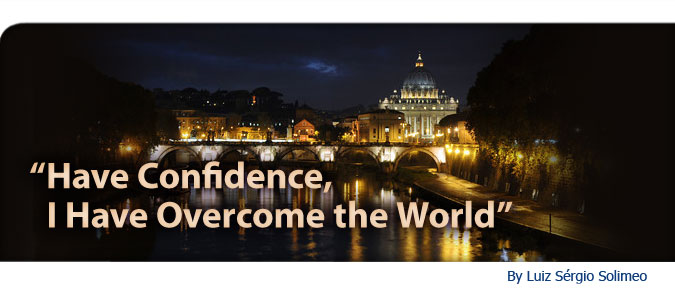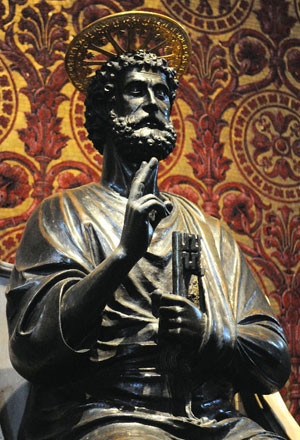Written by Luiz Sérgio Solimeo
An abyss separates the world (understood here not in its cosmological but moral sense) from the Church founded by Our Lord Jesus Christ. The world neither accepts being guided by, nor comprehends the Light that came to illuminate it.[1] The world does not live for God or for life eternal, but for itself. Closed off in its naturalist egoism, it divinizes the present, the passing moment.
The World’s New Emperor: the Media
That is why the world wastes no chance to attack the Church by distorting facts or taking advantage of the weakness of Her members, to come up with sophisms and mockeries that echo Voltaire’s sardonic laughter. Not only does the world not accept being guided by the truth of which the Church is the custodian, but, through its emperors (as in the times of old) or the media (the new powers that be) it even wants to rule over the Mystical Spouse of Christ. The secularist agenda would like future Vicars of Christ to e as transitional as mere CEOs of a company, and not the representative of Our Lord Jesus Christ, the invisible head of His Mystical Body, the Holy, Roman, Catholic and Apostolic Church.
Taking Advantage of the Pope’s Resignation
Thus, the way the media is taking advantage of Benedict XVI’s resignation from the Papacy to force the Church to accept its secular agenda is not surprising in the least. By this agenda, his resignation should become standard procedure in the Church, making future Popes as transitional as heads of government in present-day democracies, who govern for a few years and are replaced. From this secularist agenda’s perspective, the Popes should be elected not just by the cardinals, but also by the bishops, and even by the faithful. Last but not least, they want the new Pope to change Church teaching, making fornication, adultery, homosexual practice, divorce and abortion normal and morally acceptable.
False Theologians, Worldly Catholics
Catholics identified with the spirit of the world, as well as “liberal” or “progressive” theologians and lay leaders who have long abandoned the dictates of Revelation and the Magisterium, echo this agenda and invent sophisms which they present as theological arguments. There is no doubt that His Holiness’ resignation was unexpected and thereby shocking. Even truly Catholic commentators have emphasized how this resignation can, at the present time, convey the impression of creating a new paradigm for the exercise of the Papacy.
Let Us Have Confidence
In this situation, the most important thing that we, the Catholic faithful, must do is not to allow ourselves to be carried away by the media harping on one issue or another, with its spinning of hypotheses and counter-hypotheses, or burying us beneath an avalanche of known and unknown facts, which can leave us stunned, uncertain, and discouraged. No matter what happens — and we should be prepared for huge surprises — it is essential that we hold fast to the promise of our Divine Savior that the Church is immortal and that the gates of hell will not prevail against Her.[2]
As Our Lord entered Jerusalem, welcomed and acclaimed by the populace, He alone saw the Passion ahead, and how these same people would clamor for His Crucifixion and Death. But He was not perturbed. In the titanic struggle between the world’s naturalist mentality and the Church, we may suffer setbacks, we may be tempted, but we must never allow ourselves to become discouraged, as this fight has already been won: “Have confidence, I have overcome the world.”[3]
Confidence: Not a Fruit of Optimism, But of Faith
The confidence that comes from these words of the Savior does not mean optimism, superficiality, or willful ignorance of threats and danger. Above all, it does not mean giving up the fight. It means that amid confusion, disinformation, and the fleeting victories of liberal Catholics and of the world, in the end, the Church will always triumph.
The Church Will Remain Faithful to Her Divine Foundation
By divine institution, the Church is a monarchy whose visible head is the Pope. He represents — but does not replace — the true monarch of Whom he is the Vicar on earth: Our Lord Jesus Christ, the invisible head of His Mystical Body, the Holy, Roman, Catholic and Apostolic Church.
“Thou art Peter; and upon this rock I will build My Church, and the gates of hell shall not prevail against it.” [Matthew
The Church’s institutional form cannot change, nor can Her doctrine or morals. By natural law and by Revelation — interpreted consistently in the same way for two thousand years by the Magisterium — adultery, fornication, homosexual practices, divorce and abortion will never be made good and acceptable. And no Pope has the power to change the sinfulness of such practices because, as the First Vatican Council reaffirmed, upon promulgating the dogma of Papal Infallibility, “the Holy Spirit was not promised to the successors of Peter that by His revelation they might disclose new doctrine, but that by His help they might guard sacredly the revelation transmitted through the apostles and the deposit of faith, and might faithfully set it forth.”[4]
Fidelity to the Church
Let us therefore have confidence. Let us pray and ask God that He protect His Church. Let us have recourse to the intercession of the Blessed Virgin, Mother of the Church, asking that these times of trial be abbreviated, and begging Her to help us remain faithful to the One, Holy, Roman, Catholic and Apostolic Church, “the new Jerusalem, coming down out of heaven from God,”[5] the Mystical Spouse of Christ, “without spot or wrinkle.”[6]
1. John 1:1-9.↑
2. Cf. Matt. 16:18.↑
3. John 16:33.↑
4. Pastor Aeternus, Chap. IV, Denzinger, no. 1836 [translated by Roy J. Deferrari].↑
5. Apoc. 21:2.↑
6.
Eph. 5:27.↑





No comments:
Post a Comment